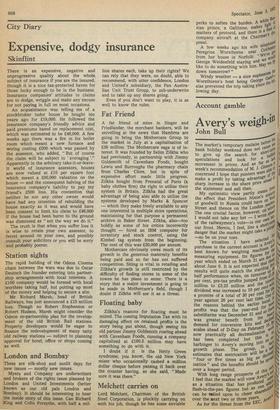City Diary
Expensive, dodgy insurance
Skinflint
There is an expensive, negative and unprogressive quality about the whole subject of insurance if you are the insured, though it is a nice tax-protected haven for those lucky enough to be in the business. Insurance companies' attitudes to claims are to dodge, wriggle and make any excuse for not paying in full on most occasions.
An acquaintance was telling me of a stockbroker tudor house he bought ten years ago for £18,000. He followed the insurance company's friendly advice and paid premiums based on replacement cost, which was estimated to be £46,000. A few weeks ago there was a fire in his boiler room which meant a new furnace and wiring costing £500 which was passed by the assessor, who added, "But of course the claim will be subject to 'averaging '." Apparently in the arbitrary take-it-or-leaveIt world of insurance assessors, houses are now valued at £10 per square foot which meant a £90,000 valuation on the house — and the consequent halving of the insurance company's liability to pay my friend's £500 loss. His contention that neither he nor any other owner would have had any intention of rebuilding the house exactly as it was and would have been content to limit his claim to £46,000 if the house had been burnt to the ground was dismissed as "not the way we do it." The truth is that when you suffer loss it is wise to retain your own assessor, to ferret around on your own, and possibly consult your solicitors or you will be sorry and probably poorer.
Station sights
The rapid building of the Odeon Cinema chain between the wars was due to Oscar Deutsch the founder entering into partnership arrangements with local interests. A £100 company would be formed with local worthies taking half, but putting up most of the money and helping to secure a site.
Mr Richard Marsh, head of British Railways, has just announced a £15 million loss. Though no Robert Stephenson or Robert Hudson, Marsh might consider the Odeon co-partnership plan for the revelopment of the old British Rail stations. Property developers would be eager to finance the redevelopment of many tatty old railway stations — subject to planning approval for hotel, office or shops coming as well.
London and Bombay
These are silk-shod and sunlit days for new issues — mostly new issues.
Myers and Company are underwriters and brokers of the rights issue planned by London and United Investments (better known as our old pals London and Bombay). It should be interesting to hear the inside story of this issue. Can Richard King and Colin Forsythe, with half a mil lion shares each, take up their rights? We can rely that they were, no doubt, able to recommend, with utter confidence, London and United's subsidiary, the Pan Australian Unit Trust Group, to sub-underwrite and to take up any shares going.
Even if you don't want to play, it is as well to know the rules.
Fat Friend
A fat friend of mine in Singer and Friedlander, the merchant bankers, will be snivelling at the news that Hambros are going to bring the Mothercare Group to the market in July at a capitalisation of £36 million. The Mothercare saga is of interest. It was founded by Selim Zilkha who had previously, in partnership with Jimmy Goldsmith of Cavenham Foods, bought Lewis and Burroughs the pharmacy chain from Charles Clore, but in spite of expensive effort made little progress. Zilkha bought from Prenatal of Paris (a baby clothes firm) the right to utilise their system in Britain. Zilkha had the great advantage of being also able to utilise the systems developed by Marks & Spencer — which they make freely available to any one interested in multiple store operations, maintaining for that purpose a permanent archive in Baker Street. Zilkha, also—too baldly as some of his critics incorrectly thought — hired an IBM computer for inventory and stock control, using the Kimbel tag system from the beginning. The rent of this was £30,000 per annum.
Mothercare obviously owes much of its growth to the generous maternity benefits being paid and so far has not suffered competition. Siting is vital in retailing and Zilkha's growth is still restricted by the difficulty of finding stores in some of the towns he has plans to enter. There is a story that a major investment is going to be made in Mothercare's field, though I doubt if Zilkha will see it as a threat.
Floating baby
Zilkha's reasons for floating must be mixed. The coming Imputation Tax with its damaging effect on retained profits is the story being put about, though seeing his old partner Jimmy Goldsmith roaring ahead with Cavenham Foods, running a company capitalised at £160.5 million may have something to do with it.
I doubt if it is the Hetty Green syndrome, you know, the old New York miser who occasionally cashed a million dollar cheque before passing it back over the counter having, as she said, "Made sure it was there."
Melchett carries on
Lord Melchett, Chairman of the British Steel Corporation, is pluckily carrying on with his job, though he has some enviable 10 perks to soften the burden. June JAwhmps, of sian prince, a Galitzine, makes bg"", of matters of protocol, and there is a riesA".s, ' company aircraft at the Chairmans "I posal. honed lowing day. telep”oPeAregfreinwe wWeeokrsstahgoornehis near Co, Windy weather — a nice euPhCerholicleslft,:ert' from her house in Norfolk: " We'srl,guld George Weidenfeld staying and we ;fly like to do something with him. Mg "down tomorrow?"
Worsthorne's host being George alas prevented the trip taking place the f












































 Previous page
Previous page